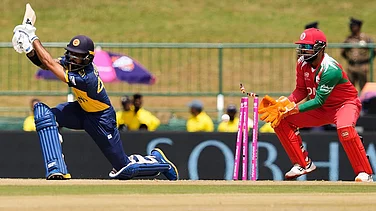Jaffer, a former Test player with highest number of caps and highest runs in first class Indian cricket, was recently alleged for favouring Muslims over Hindus and communalising the dressing room atmosphere by none other than players and manager of Uttarakhand cricket team of which he was coach.
In a country where media now fans communal flames on a daily basis, it was no surprise to see that very few cricket stalwarts came in support of Wasim Jaffer, who has lifted 10 Ranji Trophy titles for Mumbai and Vidarbha. Barring Anil Kumble and Irfan Pathan, not even his former national teammates spoke in his favour.
Social media was buzzing with this news with some supporting and many criticising Jaffer. A lot of people wrote that politics has possessed and ruined cricket. And that cricket is and should be apolitical and all aspects of it must be free from political influence whatsoever the word of mouth of all was. It would be good for us to understand that the very genesis of cricket in British India has been political.
Psychoanalyst and intellectual Ashish Nandy in his book “Tao of Cricket” writes that “Colonialism and Neocolonialism can be better understood by cricket than Political economy”.
Political Weapon
Cricket was an elite and colonial game. The importance of cricket is that it has complexities of socio-political mesh. It has been used as political weapon against racism, casteism etc at many places like Africa, West India, India.
Cricket philosopher and author CLR James gives brilliant example regarding it vis-a-vis West Indies cricket in his book Beyond the boundary. He writes, “Cricket within the boundary and even beyond it is linked to the complexities of a socio-political cultural mesh. The history of the West Indian land for the last two centuries is also the history of Caribbean cricket. The game became a political weapon to fight against racism as much as any other artificial artifact or political rallies. This is not to belittle the latter, but to speak of the importance of the game.”
Coming back to British India, cricket here was first explored by Parsees during 1840s when Englishmen would play in Bombay Gymkhana. Parsees were an affluent community and played the game to get into elite colonial British connections and collaboration. As per cricket historian Prashant Kidambi in his book “Cricket County, The untold History of the first All India team,” the first team which visited overseas had all Parsee players in 1886.
Parsees Showing The Way
Parsee Gymkhana was the first cricket club to be formed by Parsees and in next two decades, over 30 more clubs were formed by them, mostly named after British Viceroys which only establishes the connection between elitism, cricket and politics.
After Parsees, it was the turn of rulers of princely states to use cricket for elite connections and collaboration which would give political mileage and help them consolidate power in their states.
Cricket was also used as a diplomatic and peacemaking tool even during British Raj. Maharaja Bhupindar Singh of Patiala led a cricket team to England in 1911 as a gesture of peace and friendship to Britishers, after revolutionary Madan Lal Dhingra assassinated British official Sir Curzon Wyllie in Britain. He also went on to become the president of Indian Olympic Association in 1928 and donated 500 Pounds to the first Ranji Trophy in 1934.
As per cricket historian Boria Majumdar in his book “Lost histories of Indian cricket,” India’s first cricketer Maharaja Ranjit Singhji became emperor because of cricket only. Born to the cousin of Jama Sahib of Nawanagar, who had no heir, Ranjit Singhji was adopted by him to continue ruling legacy. After some time, a concubine of Jama Sahib gave birth to a son, leading to controversy that this son will be heir of Jama Sahib. It was because of cricket, Ranji became emperor by getting into elite connections to plead his case.
Historian Ram Guha in his book “A corner of a foreign field, The Indian history of a British sport,” writes in detail about a great dalit cricketer Palwankar Baloo. His three other brothers also played cricket. Palwankar was earlier mentor of Ambedkar, whenever Ambedkar used to speak about dalit politics; he used to speak about life, struggles, and achievements of the former. Gandhi manipulated Palwankar and used him against Ambedkar in 1932 when the latter was advocating for separate electorates. Congress made Palwankar contest against Ambedkar in 1937 in Bombay legislative assembly elections; this shows the nexus between politics and cricket.
Riding The Cricket Stars
Even in post-colonial India, leading cricketers like Kapil Dev and MS Dhoni have been given honorary positions in army to boost morale of army men. Dhoni (2011 World Cup winning captain and thus a national hero) travels to Kashmir time to time to boost the Indian Army. This also become photo op and serves a further purpose of fuelling nationalistic zeal amongst common masses due to pre-existing notions about Army and Kashmir.
In 1983, Kashmiri youngsters dug a pitch during the lunch break of the India-West Indies one-day game, as it would have sent a 'wrong' sense of normalcy to the outside world.
Cricket has been used to protest against policies in different countries too. English cricketer Moeen Ali used wrist band on right hand in which “Save Gaza” was written to protest against the policies of Israel in Palestine during the third Test against India in 2014.
When Zimbabwe co-hosted the World Cup in 2003, people protested against conducting it in Zimbabwe as the host country was suffering because of the policies of dictator Robert Mugabe. Zimbabwean cricketers Andy Flower and Henry Olongo used a wrist band in which “death of democracy in Zimbabwe” was inscribed as a form of protest. They were forced to retire and had to flee country for life.
To conclude, cricket is political and has always been so. CLR James in book “Beyond the boundary” writes “what do they know of cricket, who only cricket know?”
(Faizan Bhat is an independent researcher from Kashmir. He writes on
South Asian politics and cricket. Views personal)





















